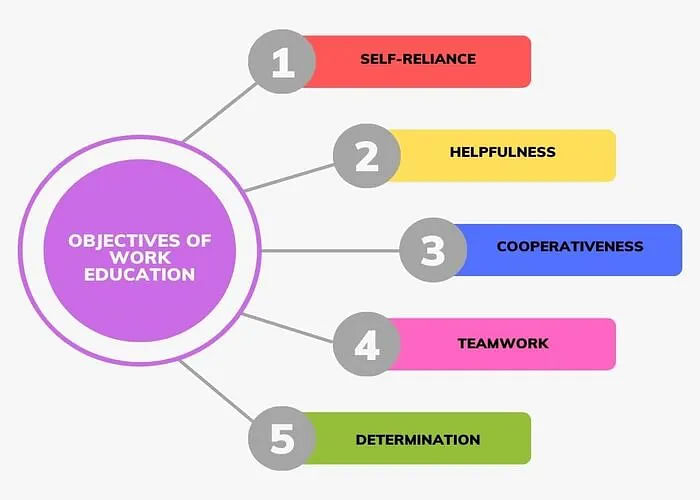Work education provides students with exposure to social and economic activities inside and outside the classroom. It helps them understand and build skills related to work education which will help them uplift themselves and be independent.
Work Education comprises activities consisting of services, foods, and community development in various areas of human needs such as health and hygiene, food, clothing, recreation, and social service in accordance with the mental abilities and manual skills of children at various stages of education.
The importance of work education is that it helps individuals efficiently handle the demands and challenges of everyday life. Work education aids in the development of essential life skills, including problem-solving, decision-making, creative and critical thinking, empathy, and effective communication.
Work education results in services valuable to the community, besides the gratification of self-fulfillment. It focuses on building manual characters. The main objective of work education is to ensure a greater sense of worldly knowledge and develop respect for workers among the students.
What is Work Education?
Work education is the nature of knowledge that provides an identical significance to the community and social services by creating consciousness for the wellbeing of the people and society. An essential concept of work education is that it has a manual spirit. Therefore, work education plays an emphasis on learning while working in any field. Below are some features of Work Education.
- Work education provides both knowledge and skills through understandable and graded programs and helps people enter into a world of work.
- It acts as a different curricular area for offering children opportunities for participating in social and economic activities inside and outside the classroom.
- The prolific manual work situations are drawn from health and hygiene, food, shelter, clothing, recreation, and community service.
- The skills to be developed in this field should comprise knowledge, understanding, practical skills, and values throughout need-based life activities.
- Pre-vocational education should get a prominent place at work education to let students choose various activities according to their interests.
Also Read: What is Quality Education?
Why Work Education?
Work Education helps students develop skills like work values, productivity, and self-reliance. In addition, work education allows students to identify their natural interests and aptitudes in selecting suitable courses of study.
Moreover, work education conveys crucial knowledge related to career and develops proper work skills which can help the children to become productive in meeting their day to day activities.
Work Experience has been named as Work Education and thus makes it a fundamental part of education. It develops;
- Personality.
- Positive work values.
- Constructive habits.
Objectives of Work Education
Work education has specific objectives, which are very important to give the right direction to people and the community. It acts as a vital part of the learning process resulting in goods or services considered valuable to the community.
Work education focuses on teaching various socially desirable values such as;

Below is the list of objectives of work education.
- Identify the needs of every individual and their family and community concerning food, health, and hygiene to understand the working environment.
- Familiarize oneself with productive activities in the community in various sectors. It helps in gathering information about various activities in society.
- Know the sources of raw materials and understand the use of tools and equipment to produce goods and services by workers. It helps in gathering essential information.
- Develop skills for the assortment, procurement, arrangement, and utilization of tools and materials for different forms of productive work. It also helps in incorporating new skills.
- Develop self-esteem and confidence through accomplishment in productive work and services.
- Develop a deeper opinion for the environment and wisdom of belonging, responsibility, and commitment to society. It helps in developing a sense of belongingness within people.
- Develop reverence for manual work and regard for manual workers in the community to give them the utmost respect.
- Develop work habits such as punctuality, honesty, discipline, efficiency, and dedication to duty.
- Develop self-esteem and self-assurance through achievements in productive works and services in various fields.
- Develop a deeper apprehension for the environment and a sense of belongingness, responsibility, and commitment to society to ensure the community's welfare.
- Develop alertness of socio-economic problems of the society to ensure people about the changes if made.
Also Check: 10 Ways to Balance Student Life And Academics
Importance of Work Education
Work education is regarded as very important, meaningful, and the ongoing manual work is organized as a vital part of teaching-learning procedures that are functional to society and the satisfaction of doing work.
It is essential for all education segments, i.e., primary, secondary, higher secondary, and higher education. Work education can be granted through a well-developed, channeled, and structured program.
Work education is an integral part of education as,
- It helps to bridge the gap between manual workers and white-collar workers in society.
- Work education gives respect to all types of workers in all sectors, and also creates social awareness for the welfare of society.
- It builds coordination in hand actions and brain activities.
- Work education promotes socially useful physical labor by inheriting educational activities in various fields.
- It acts as a necessary and significant factor in learning different activities and the processes to pursue a particular objective.
- Work education is discernible in the form of valuable services and productive work for the community.
- It is associated as a necessary factor with all the aspects of knowledge in a multi-level education system.
- Work education is based on the principle of learning by doing and practicing.
Also Read: Importance of Adult Education
Advantages of Work Education
Work education aids in various factors to the students and the people who are looking to work in varied areas. Students gain a plethora of knowledge about almost every field, and strategies are built on understanding and practicing such education.
In addition, students are involved in activities that help them understand the concept of work education. Below is the list of advantages of work education.
- Work education links classroom learning to the real world and makes students practice various activities.
- Work education gives opportunities to perform skills in real-world scenarios beyond theoretical learning.
- Work education helps students develop soft skills for the better manifestation of gifts.
- Work education gives students a chance to watch professionals in action entitled to work in various activities.
- It helps students associate with potential employers to broaden their network. And it leads to increased student enrollment with varied skills.
- Motivates students to understand and comprehend working areas.
- Work education provides opportunities for individualized instruction to perform skill-based activities. And it gets the community involved by providing an array of exciting work.
- Work education builds a pool of skilled workers to make the empire rise.
- Teaches soft skills that help in maintaining patience while working.
- Work education lowers recruitment costs for employers as there are people who would be highly skilled in a limited number of activities.
Also Check: What is Environmental Education?
List of Activities in Work Education
Work education includes activities of services, foods, and community development. It focused on health and hygiene sectors, food, clothing, recreation, and social service in harmony with children's mental abilities and manual skills related to work education.
Work education encourages children to know their needs of themselves, their families, and society. The aim is to build students' personalities to have a successful life by having moral values in their pocket of energy.
Below is the list of activities any person can enroll themselves in.
- Computer Education
- Drawing and Painting
- Work Experience
- Project
- Western Music
- Vocal Music
- Yoga
- Knitting and Stitching
- Gadgets learning
- Western Dance
- Creative Thinking
- General Assembly
- Sports and Games
- Maths Lab
- English Lab
- Smart Class
- Silambam
- Skating
- Boxing
- Classical Dance
- Instrumental Music
Also Check:
The concept of work education bridges a gap between the general curriculum and the real-world problem solving, helping students with practical skills, ethical values, and a deep respect for labor in all its forms.










